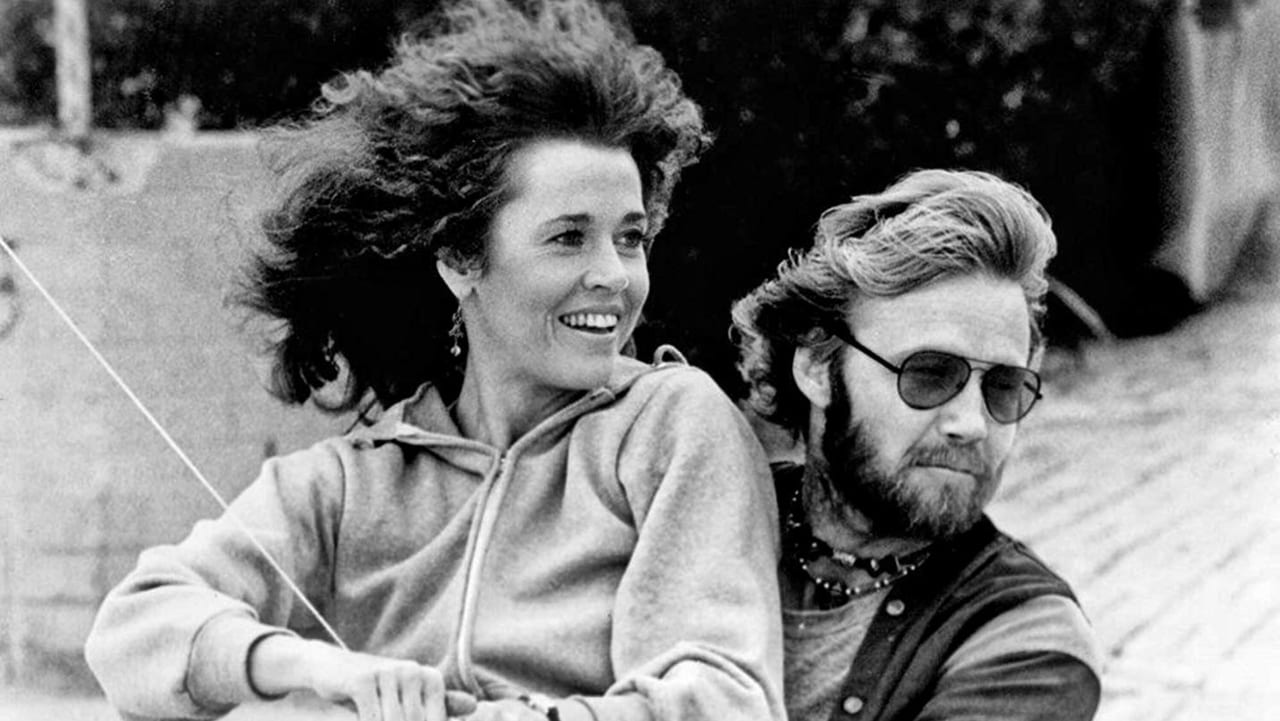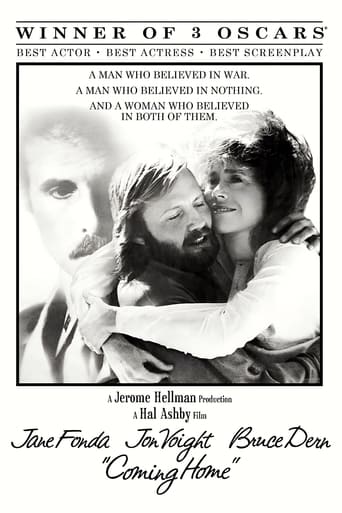



That was an excellent one.
disgusting, overrated, pointless
Absolutely Fantastic
Clever and entertaining enough to recommend even to members of the 1%
View MoreComing Home is an eclipse of a romantic drama, one in which there are no clear signs of who should be with who or what should happen to who and who deserves what. Its characters are damaged in one way or another; most are trying to figure out what to do with their fragmented lives. Should they do what is considered to be the right thing? Or should they follow their heart and try to avoid causing even more damage as a result? Taking place in 1968, America has become shattered and unintentionally cynical. With the Vietnam War as a backdrop to everyday life, most are sick and tired of living under the societal pretensions of the previous decades; anger is prevalent, but an outreach of peace is too. Sally Hyde (Jane Fonda) has always been a wife first and a person second, so when her husband, Bob (Bruce Dern), goes off to fight in Vietnam, she finds herself uncertain of her priorities. She has never had to work a day in her life, and she's never been looked at as anything other than another man's property.With Bob gone, she finally has the chance to become the independent woman she never thought she could be. Sally, along with her friend Vi (Penelope Milford), decide to volunteer at the local V.A. hospital. There, she meets Luke Martin (Jon Voight), a past acquaintance who is back from Vietnam after an accident leaves him paralyzed from the waist down. Luke is understandably upset with how his life has turned out, and as Sally gets to know him, she not only develops feelings for him, but she also finds herself more aware of the mess the U.S. is in. She still loves her husband, but he has grown increasingly distant after facing violence on such a regular basis. When he comes home, Sally is forced to decide whether to remain a wife or start her life anew.Coming Home isn't a women's picture as its plot might suggest; it's something much closer to the heart and something more important to American history than a drama where romantic triangles run amok. It is one of the most essential films of the 1970s. Painting an unfiltered picture of life after Vietnam, it is by turns humanizing, upsetting, and moving. The characters are completely different people by the end of the film: Sally starts as a quiet housewife and ends as a woman in touch with her surroundings and her personal needs; Luke goes from the mindset of a bitter victim to an impassioned protester; Bob sheds his typical spousal roles and becomes an emotionally impaired disaster. Such transitions are risky, as they may not always ring true in the development of a certain figure. But Coming Home never stops being earnest. It could be moralizing, but like Sally, we are left to make our own decisions.Ashby, a seminal director of the decade, doesn't pick sides, preferring to let his characters go loose and see what paths they set for themselves. Like Robert Altman or John Cassavetes, you can feel his presence, but his presence does not interfere with the naturalness of any given situation. The Stones, Simon & Garfunkel, golden era Beatles, and Jefferson Airplane play at a near constant pace, almost as if Ashby is trying to remind us that times are changing and the world isn't what it used to be. It used to be a place where people only really "made it" if they got married and settled into domestic bliss. But now, with its preference for soft rock and free love, America isn't content to simply settle. Coming Home carries a restless energy; moving forward, not backward, is the only option. Fonda, Voight, and Dern are all outstanding, even if the third act leaps into melodramatic territory and betrays the realism set so effortlessly in the first two. The '70s explored film in a way that no other decade has, and Coming Home serves as one of the most authentic excursions into a culturally relevant topic. It's a life-on-the-home-front picture that makes life on the home front seem just as alien as life on the battlefield.Read more reviews at petersonreviews.com
View MoreComing Home was one of the films from the first wave of Vietnam War movies. Like The Deer Hunter, also from the same year, it deals with the effects the war had on the people back home in America, both ex-soldiers and wives. It examines the psychological fallout. It's in essence about a love triangle – a woman, her husband who has gone to the war and a physically damaged soldier who has returned. These personal relationships add a considerable layer of complexity to the anti-war themes directly levelled at the Vietnam situation. So the movie is a quite detailed set of motivations and impulses from a group of damaged individuals. One man is physically crippled, the other mentally broken, while the woman in the middle is lost. The primary reason that it all works so well is on account of towering performances from the three leads, namely Bruce Dern, Jane Fonda and Jon Voight. All three are extremely good and drive the dramatics. The style of the movie is very loose in terms of both dialogue and also camera-work. It lends a sense of realism that works in its favour and keeps the feel very personal.Its director Hal Ashby made a series of highly impressive films throughout the 70's and this is simply another example. The anti-war message is certainly quite clearly given, culminating in a scene where Voight delivers an impassioned speech to a group of high school students about his feelings about his participation in the war; it's a powerhouse moment. It seems that many people don't like the ending very much though, particularly where Dern's character kills himself by swimming out into the ocean. I myself thought it powerful and one that isn't as morally weak as some others believe, after all Dern's suicide doesn't simply resolve the love triangle problem for the other two characters but it also would leave them with a considerable amount of guilt due to their actions contributing to this action. It's an intense but strong ending in my view. Also of note is a particularly strong soundtrack of 60's rock songs, including the very rare use of original Beatles recordings on a film score.
View MoreI know that "Coming Home" won several Oscars and is considered a classic, but I have one major gripe with this film. While I liked the film overall, I truly hated the film's soundtrack. Instead of incidental music, the film is FILLED with nothing but late 60s rock and roll in scene after scene after scene. This sort of thing started in the 1970s and a ton of films were just jam-packed full of pop or rock songs. But, it's very distracting to me--and I hate that there aren't enough quiet moments in the film and it feels, at times, like I'm watching MTV and not a serious drama. And, compared to other films that shove song after song into them (like "American Graffiti"), "Coming Home" is much, much more invasive in its use of music. The bottom line is that I HATED the soundtrack! The film is about a woman (Jane Fonda) who is home waiting for her husband (Bruce Dern) to return from his tour of duty in Vietnam. To fill her time, she volunteers to work with disabled men at the local VA hospital. Soon, she develops a relationship with a bitter paraplegic (Jon Voight). Over time, he lets go of much of his anger and he and Fonda have an affair. The impact of this on their marriage and Voight's subsequent anti-war crusade make up much of the rest of the film.The acting was pretty good--particularly Voight. As for Fonda, I thought she was just okay and wonder if her receiving the Oscar (along with Voight) was more of an anti-war statement or a show of support for her behaviors during the war. Or, possibly it was just a slow year. All I know is that I expected something more for a prize-winning performance. As for the story, it's very much anti-war--and emphasizes the emotional and physical toll on the men who fight. This is something applicable to all wars--not just Vietnam. This universality is heightened by having no footage of the war. Without the terrible music, I'd give this one a 9--with it, 7. Yes, the music was THAT annoying.By the way, this is a very adult film. It contains nudity and lots of harsh language. So, this is probably not a film to show your mother-in-law or a pre-school class.
View MoreA flawed film. But also a film of tremendous grace, power, and originality. The flaws; Bruce Dern's character is criminally underdeveloped, and comes off more as a cliché than the other two leads, which damages the power of the films climax. For the film to fully work, we have to believe that Fonda would consider staying with this man, who starts as a martinet, and ends up frightening unbalanced, and dangerous, while Jon Voight seems a near saint. Fonda's character also starts off as a cliché, but deepens quickly as the film goes on. And some of the use of 60s rock songs are bit too on the nose, their comments a bit too obvious. Yet all that said, there is also magic here; in Jon Voight's magnificent performance – arguably the best he's done, in Jane Fonda's fine work. In the feeling of almost documentary realism in the moments of their relationship, in the radical (especially for it's time) dealing with sex and a paraplegic, and the scars of Viet Nam of individuals and a nation. Haskel Wexler's cinematography is also very strong. This is a film who's special moments so stick with me (e.g. Voight's speech to a bunch of high school kids) that I can look past the flies in the ointment.
View More